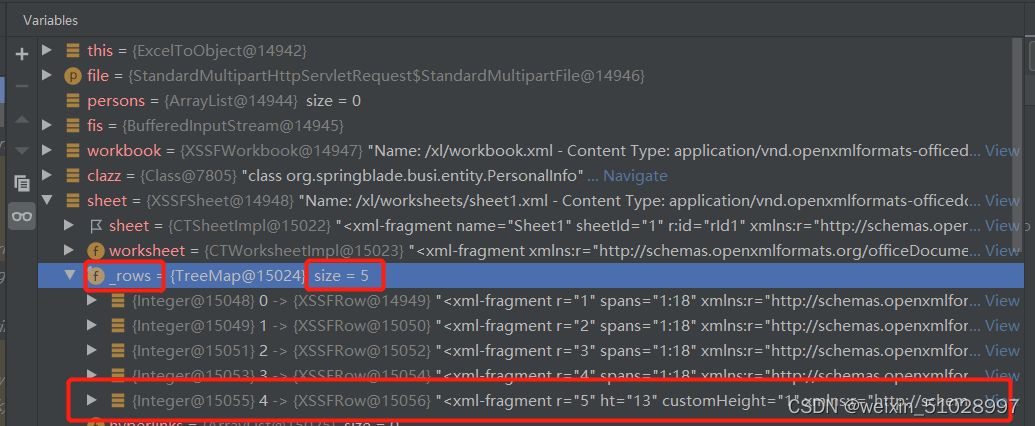Java使用POI从Excel读取数据,解决读取到空行问题,并存入数据库。
项目场景:需要从Excel读取多行数据,映射到java对象,并存入到数据库当中(单Sheet版)
问题分析
例如:读取数据映射到java实体类的时候,发现了有一条数据的属性都为null,导致一些方法的空指针异常。通过debug我们发现,实际上Excel当中数据有4条(包括header),但是在使用poi读取并映射到java实体类的时候却映射了5条。

解决方案:
既然最后一条数据读到的是没有数据的一行,我们就可以在遍历excel数据的时候加一条判断,每一行当中每一个单元格的通过poi读取后,在java中岗位cell类型的对象,只需判断是否为null,若为null直接结束遍历即可。

其中最外层循环,为遍历每行数据。内层循环为遍历每行数据当中的单元格Cell,内层循环的数量是根据第一行(header头部标题)的数量来决定的。
完整代码:
maven先导入poi相关jar包,本人使用的是 4.1.2 版本。
<dependency>
<groupId>org.apache.poi</groupId>
<artifactId>poi-ooxml</artifactId>
<version>${poi.version}</version>
</dependency>
<dependency>
<groupId>org.apache.poi</groupId>
<artifactId>poi</artifactId>
<version>${poi.version}</version>
</dependency>
<dependency>
<groupId>org.apache.poi</groupId>
<artifactId>poi-scratchpad</artifactId>
<version>${poi.version}</version>
</dependency>该代码为单sheet版本,若为多sheet版本只需在外层加一层for循环遍历sheet即可。
若Excel表中数据为日期,可以使用cell.getDateCellValue()来获取,cell提供的方法很多,可以根据具体情况来进行获取。
import org.apache.poi.ss.usermodel.*;
import org.apache.poi.xssf.usermodel.XSSFWorkbook;
import org.springblade.busi.entity.PersonalInfo;
import org.springblade.busi.framework.annotation.InfoChangeAnnotation;
import org.springframework.web.multipart.MultipartFile;
import java.io.IOException;
import java.io.InputStream;
import java.lang.reflect.Field;
import java.util.ArrayList;
import java.util.Iterator;
import java.util.List;
public class ExcelToObject1 {
/**
* 读取Excel文件,版本:只读取基本信息一个Sheet,若有需要多个sheet在增加for循环
*
* @param file
* @return
*/
public List<PersonalInfo> toPersonalInfo(MultipartFile file) {
//创建返回对象
List<PersonalInfo> persons = new ArrayList<>();
try (InputStream fis = file.getInputStream();
Workbook workbook = new XSSFWorkbook(fis)) {
Class<?> clazz = PersonalInfo.class;
//只读取基本信息一个Sheet
Sheet sheet = workbook.getSheetAt(0);
Row headerRow = sheet.getRow(0);
List<String> columnNames = new ArrayList<>();
Iterator<Cell> cellIterator = headerRow.cellIterator();
while (cellIterator.hasNext()) {
Cell cell = cellIterator.next();
columnNames.add(cell.getStringCellValue());
}
for (int rowIndex = 1; rowIndex <= sheet.getLastRowNum(); rowIndex++) {
Row row = sheet.getRow(rowIndex);
PersonalInfo person = (PersonalInfo) clazz.newInstance();
//获取Excel当前行的第一位,若未null则不处理 ---> 防止poi读取Excel多读取没有数据的一行,导致非空字段为空。
Cell cellNow = row.getCell(0);
if (cellNow == null) {
break;
}
for (int columnIndex = 0; columnIndex < columnNames.size(); columnIndex++) {
Cell cell = row.getCell(columnIndex);
String columnName = columnNames.get(columnIndex);
//通过实体类注解与Excel头部中文进行映射
Field field = getFieldByColumnName(clazz, columnName);
if (field != null) {
field.setAccessible(true);
field.set(person, getCellValueAsString(cell));
}
}
//处理每一行Excel加到返回对象当中
persons.add(person);
}
} catch (IOException | IllegalAccessException | InstantiationException e) {
e.printStackTrace();
System.out.println(e.getMessage());
}
return persons;
}
//通过实体类注解与Excel头部中文进行映射
private static Field getFieldByColumnName(Class<?> clazz, String columnName) {
for (Field field : clazz.getDeclaredFields()) {
InfoChangeAnnotation annotation = field.getAnnotation(InfoChangeAnnotation.class);
if (annotation != null && annotation.value().equals(columnName)) {
return field;
}
}
return null;
}
//获取每个单元格数据并转为String,其他类型在上方做了ifelse
private static String getCellValueAsString(Cell cell) {
if (cell == null) {
return null;
}
cell.setCellType(CellType.STRING);
String cellValue = cell.getStringCellValue();
System.out.println("getCellValueAsString:" + cellValue);
return cellValue;
}在映射java实体类的时候需要在其实体类属性添加注解,注解可以自行创建,也可以引用其他带有value的注解,本文章使用的是 @InfoChangeAnnotation("Excel表中第一行的中文")。直接可以与Excel表头进行映射。 上述代码中PersonalInfo为需要映射到java的实体类,必须根据实际情况进行修改。
@InfoChangeAnnotation("姓名")
private String personalName;